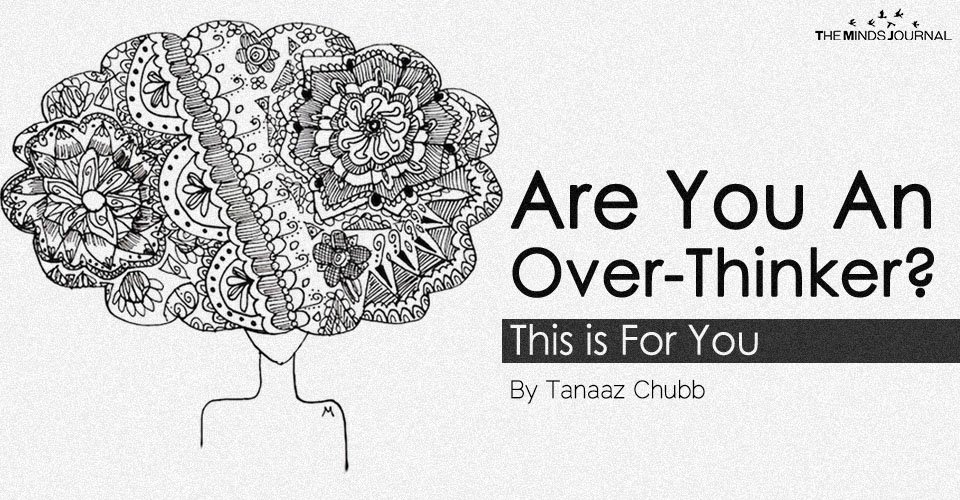I am a thinker. Correction. I am an over-thinker. Maybe it is because of my Gemini rising. Maybe it is because my Moon is in Virgo. Maybe it is just because.
I love to think. And think and think some more. I like to think so much that my thinking becomes a combination of therapeutic and detrimental all at the same time.
Kind of like that first glass of wine. One glass may be therapeutic after a long day, but 3 maybe 4, it starts to become detrimental to your health.
Am I alone?
I meet many thinkers on my path. Partly because like attracts like and partly because I love meeting people who think deeply and like to express deeper thoughts.
All of this is great, except when my thinking becomes detrimental.
Read 18 Things You Only Understand, If You Are an Anxious OverThinker
What is detrimental thinking?
- Thinking to the point of stress or anxiety
- Thinking that causes you to feel confused or stunted in making decisions
- Thinking that causes obsessive behaviors like overeating or over analyzing
- Thinking that creates an energetic cloud or fog over your life and aura
I sometimes feel that when I get into one of my thinking rampages that I have smoke or clouds of fog circling around my head. I can sometimes feel this fog rising up around me, blocking my third eye and making my head feel heavy.
Yes, my thinking and mental chatter can be powerful.
Can you relate?
Every thought carries with it vibration and every time you think or allow your mind to run with chatter, you are actually creating a powerful stream of energy.
This energy carries its own vibration, which very quickly starts to paint and color the reality that you live in.
See, we are not dancing to the tune of the world, in fact, it is the opposite. The world is dancing to our tune. Reality is painted based on what we are emitting from our vibration.
This means that mental clutter causes a cluttered life. This means that mental clutter causes indecision, stagnancy, sickness, a lack of motivation and even depression.
Our minds are so powerful that they can influence our mood, our life and the reality that we live in.
This is why it is so important to learn how to tame those thoughts and to shift your focus and awareness out of your mind and into your heart.
Everyone talks about following their heart, but what does this really mean? For a thinker, following your heart may seem somewhat foreign.
Following your heart is really about feeling your decisions and acting without the need to break things down again and again in your mind.
It is about turning off that ‘thinking portion’ of the brain and just switching into action mode.
Your heart or your feelings are then able to protect you and guide you to making the right decision, which is essentially the decision that feels good.
This definitely takes practice, but when you start to channel this way of thinking you not only feel freer and happier, but you also feel more motivated to make decisions and less caught up in the thoughts going through your mind.
Read 14 Things All Over-Thinkers Will Understand
Here are some tips and pointers to help you become less of a thinker and more of a feeler-
1. Meditate:
I know, everyone says it but it really does work. Join a class, find a YouTube video, do whatever you need to do to get in the habit of meditating daily, even if it is just for 10 minutes. It really will help.
2. Allocate Thinking Time:
I often have the best and most productive thoughts in the shower. Try to allocate your thinking time to the shower. If you notice thoughts coming up during the day that are unproductive and heading into over-drive, stop yourself and save it for shower time. When shower time does roll around, you will often be more selective of the thoughts that you choose to have.
3. Say Stop:
When you notice your thoughts starting to get repetitive or stressful, simply say to yourself ‘Stop’ and then focus on something else, like how you are feeling, or what you are doing. Staying present will definitely help.
4. Morning Pages:
A fantastic writing exercise to clear your mind for the day. You can read more about this practice here.
5. Exercise:
Being active is a great way to clear mental clutter and helps you to stay positive. Aim to exercise for at least 30 minutes every day.
6. Flower Essences:
These remedies work on a vibrational level and can help support positive mental thinking and reduce stress. You can read more about them here.
Over-thinking is simply excess energy and when you learn to channel this excess energy into something positive you can change your life in profound ways.
A mind that is stimulated doesn’t have time for annoying over-thinking, so work out how to channel this energy into something else beneficial.
When your thinking becomes therapeutic rather than destructive, you will feel:
- Happier with your life
- More certain of your decisions
- More grounded on your path
- Lighter and freer
- A sense of clarity
When you stop the obsessive-compulsive thoughts and get connected with your heart your life will change.
Would love to hear your thoughts on this! Feel free to share in the comment section below.
Source Forever Conscious









Leave a Reply
You must be logged in to post a comment.